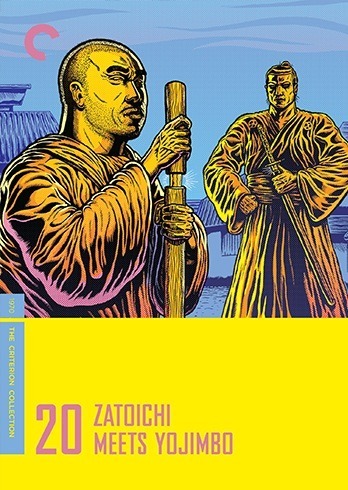The American remake of Zatoichi is
a decade-spanning series about a blind gunman. His cane hides a gun of some
kind, maybe a rifle or a shotgun. Probably a shotgun (maybe a sawed off one, this
is close range after all).
Remakes of other samurai films might lead one to believe that this
is a Western of some sort, but there are plenty of those already. I think it
should be in the modern day, or maybe even in the near future.
Or maybe it would just be a Daredevil reboot.
While we’re thinking about near future, let’s look ahead to May 6,
2016. Around that day, I am going to be seated in a crowded movie theater,
likely an IMAX theater. On the screen will be Batman vs. Superman,
the big match up between two of the biggest named in superheroes. And as I sit
in that theater watching Ben Affleck beat up Henry Caville or whatever it is
that Zack Snyder’s got cooking up, I’m going to think back to today, February
22, 2014.
But then I’m going to think back even further, back to 1970, when
Japanese movie goers were given the chance to see Zatoichi, gone for two years after a constant
string of 19 films over 7. The masses must have craved the blind swordsman’s
return. And when it came, he wasn’t alone. Beside him was Toshiro Mifune as the Yojimbo! Whoa. Imagine the hype that must have
surrounded that release. Batman and Superman are cool or whatever, but Zatoichi, man. AND YOJIMBO! DUDE!
That’s where it’s at.
And that’s where I’ll be while Zack Snyder recreates 9/11 again in
front of me.
It was sort of off-putting to see the Yojimbo in color. I’m so
used to his black and white incarnation that I didn’t even recognize him at
first. It just didn’t look right. But it was him, being a drunk. And it made me
realize that it has been far too long since I’ve watched a Kurosawa film. In
fact, I don’t think I’ve seen one since I began writing for the internet. How
ridiculous is that?
(Very.)
But the thing that’s strangest about Zatoichi Meets Yojimbo is just how far everything seems to have
come in the in the last 5 years. As you may recall, this completes my personal
trilogy: Revenge, Vengeance, Yojimbo. And in the time between Vengeance and Yojimbo, a
whole lot has happened. Technically, both of the early Zatoichi movies were
fine. Never super interesting, but competently made.
Yojimbo is interesting. It begins in the rain and blood flows
freely (something oddly lacking from two films about getting even through
swordplay). And Ichi wants to get out. He’s done. It’s been two years, and he
wants to rest.
And I wondered again if I was missing something. He constantly
talks about events from three years prior, last time he was at his hometown. In
my personal trilogy, none of these events happen onscreen, and I can only guess
that those who followed along from the start might know what he’s blabbering on
about. But maybe they don’t.
But the events of three years prior don’t matter; what matters is
the time in between. His hometown has been taken over by the yakuza, and also
some other things happened. Then there’s mystery, murder, and intrigue, as talk
of gold bars held secretly by one man drives everyone on all sides of the fight
to search for the treasure.
(So it’s really Zatoichi
Goes Looking for Gold, and maybe the American remake would actually be set
in the Pirate era and star Johnny Depp.)
But without revenge to back him up, it was hard to follow Ichi’s
motivations. He does things that seem contradictory, and while maybe it was all
for the gold, there seems to be something beneath that. But I couldn’t for the
life of me figure out what. A discussion at the end of the film says that
Zatoichi isn’t greedy. He’s not in it for the money; juxtaposed against Ichi’s
attempt to take the found gold. But does that make him greedy? Not necessarily.
Was the gold the driving force the whole time? It couldn’t have been, because
if it were he would have just taken the gold and run. There was more to it.
Perhaps it something from his childhood that no one could really understand.
(Maybe the remake takes place at Xanadu, and Charles Foster Kane
was actually a blind gunman instead of a media mogul.)
With Yojimbo, Zatoichi’s
series turns 20. It’s a crazy milestone, if you think about it: One character
with twenty adventures (and he’s
still not done). That’s television-length levels of commitment, but it’s not
like a TV show. Each film is its own narrative, and there is no broader story.
In none of the three films does Zatoichi actually have a final goal. He does a
thing and then he’s just off to the next thing. I don’t see the endgame, and I don’t
know that there is one. I tend to doubt that the last Zatoichi movie really finalizes the character in any meaningful
way, because the films aren’t building to something. There’s no specter at the
end of the line that haunts him.
So Zatoichi films could
exist indefinitely.
He’s the James Bond of Japanese cinema. His stories continue until
the people behind them get sick of working on him. But it’s 1970, and despite
the hiatus, the character is alive and kicking. Kind of like James Bond. And
with this most recent film, it’s as good as Zatoichi has ever looked. Just like
James Bond.
So let’s imagine it: James
Bond Meets Yojimbo.
That would be amazing.

No comments:
Post a Comment